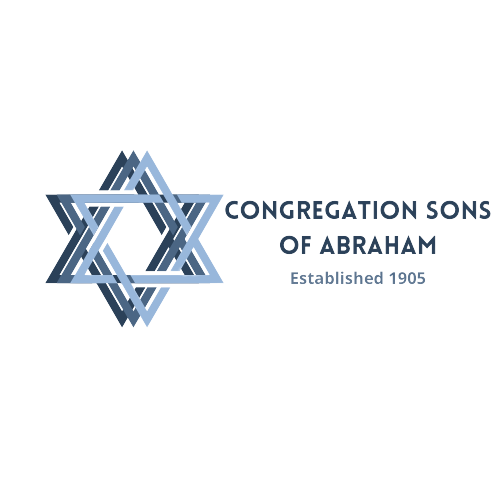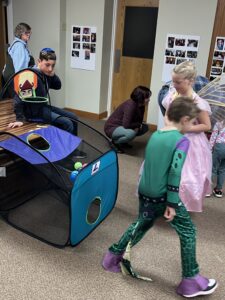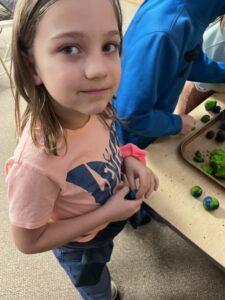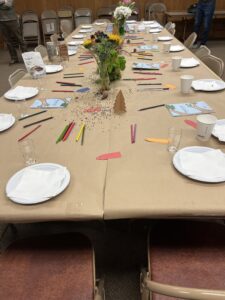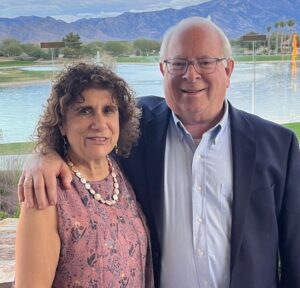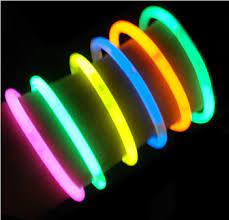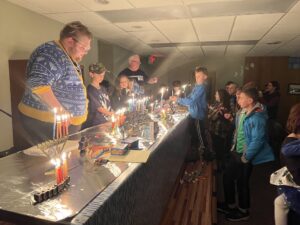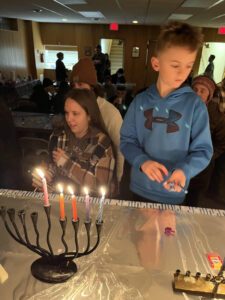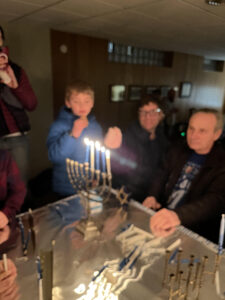
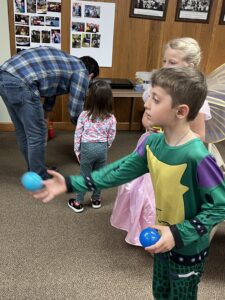
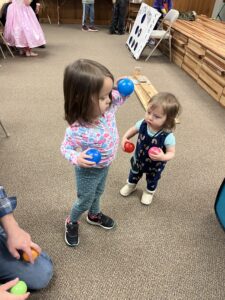
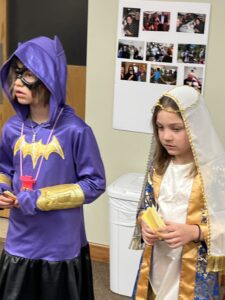
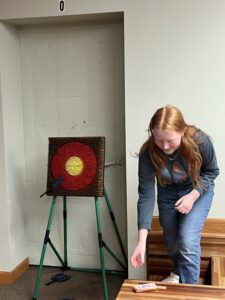
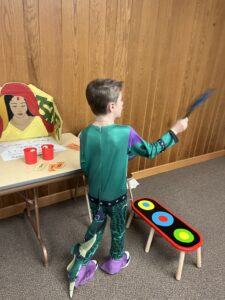
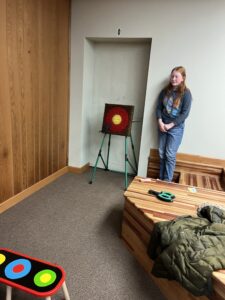
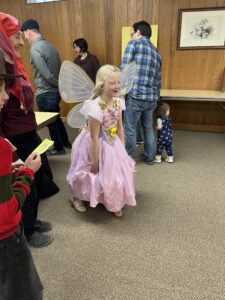
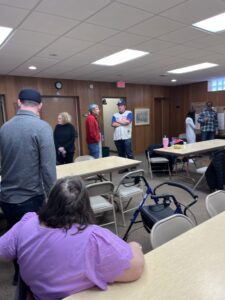
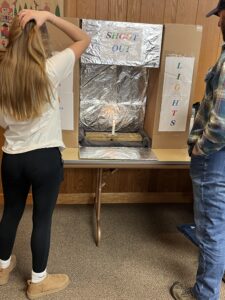
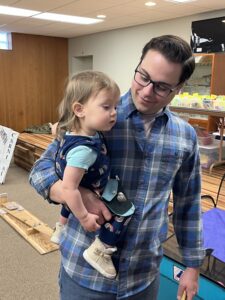
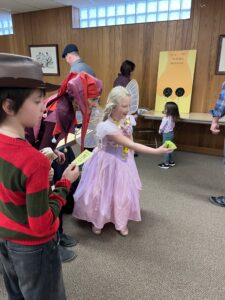

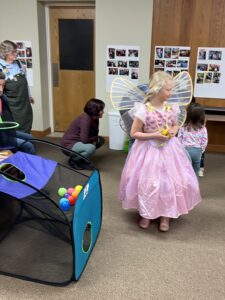
Rabbi Sam
Posts by :
Congratulations to our Cub Scouts!
Congratulations to our Cub Scouts for earning their awards for Jewish scouting. One of the most rewarding parts of being a Scout is earning an emblem. An emblem signifies the hard work a Scout goes through to learn about their religion and its customs. The National Jewish Committee on Scouting has developed a program of religious emblems as a unified, graduated program that teaches Judaism in age-appropriate increments.
Cub Scouts (grades 1–5) can earn three types of emblems: The Aryeh (for Kindergarten and First Graders), The Maccabee (which is for First through Third Graders) then allows the Scouts to advance to earn The Aleph which can be earned up through Fifth Grade with a counselor.
|
Coming Events
Friday, April 19 – Yahrzeit Minyan for Rachel Goodstein Z”L on Zoom
Saturday, April 20 – No Shabbat morning service
Monday, April 22 – Erev Pesach – Passover begins
Tuesday, April 23 – First Day of Pesach
Sunday, April 28 – 11:00 AM Edward S. Neuman Z”L – Headstone Unveiling at Cemetery
Tuesday, April 30 – 10:00 AM Yizkor memorial service, marking the end of Passover – in person at CSOA and on Zoom
Sunday, May 5 – 4:00 PM. Yom HaShoah – Holocaust Remembrance Day ceremony at CSOA
Reuters on Ceasefire Resolutions
US city councils increasingly call for Israel-Gaza ceasefire, analysis shows
By Aurora Ellis
Jan 31 (Reuters) – Some 70 U.S. cities, including Chicago and Seattle, have passed resolutions on the Israel-Gaza war with most calling for a ceasefire, a Reuters analysis of city data shows, placing more pressure on President Joe Biden ahead of a November general election to help end the fighting.
At least 48 cities have passed symbolic resolutions calling for a halt to Israel’s Gaza bombardment, with six others passing resolutions advocating more broadly for peace. At least 20 have passed resolutions condemning Hamas’ Oct. 7 attack on Israel, which sparked the current bloodshed, the data shows.
Most of the ceasefire resolutions have passed in Democratic states like California, though at least 14 have passed in swing states like Michigan that could be decisive in Biden’s re-election bid against Republican former President Donald Trump.
Biden’s administration has rebuffed calls for a ceasefire, something supported by a majority of Americans, arguing that an Israeli halt would embolden Hamas. Critics of the city resolutions say they have no tangible effect on national policy and distract from domestic issues.
Gabriela Santiago-Romero, a Detroit council member who voted to pass a ceasefire resolution in Michigan’s biggest city in November, said it reflected frustration, particularly by younger officials and people of color, with Biden and other national Democratic party leaders.
“We want leadership that is willing to listen to us,” Santiago-Romero said.
Democrats should “listen to young people, invest in diversity, invest in people that are values aligned who actually listen to their constituents,” she added.
Asked for comment, the White House, which has said it is pressing Israel to avoid civilian casualties in Gaza, referred to previous statements that a ceasefire would only benefit Hamas.
On Wednesday, Chicago became the largest city to call for ceasefire in a tight vote where Mayor Brandon Johnson broke a 23-23 tie to get the resolution passed.
Reuters compiled data from 70 cities that have passed Israel-Gaza resolutions or proclamations since Oct. 7, when Hamas militants killed some 1,200 people in Israel and took 253 hostages, according to Israeli tallies. They range from major cities like San Francisco to smaller cities such as Carrboro, North Carolina, and Biden’s hometown of Wilmington, Delaware.
Many of the ceasefire calls are modeled after Missouri congresswoman Cori Bush’s “Ceasefire Now” resolution, which also urges the release of hostages and an increase of aid into Gaza, where health officials say Israeli bombardment has killed more than 26,600 Palestinians.
At least nine of the ceasefire calls were in Michigan, where Arab Americans account for 5% of the vote and Biden’s 2020 margin of victory over Trump was less than 3%. An October poll showed Biden’s support among Arab Americans had plunged to 17% from 59% in 2020.
“This (war) is something that’s going to be on voters’ minds,” said Douglas Wilson, a Democratic strategist in the swing state of North Carolina.
“It’s gonna be an issue here and in all the swing states because of the Muslim populations in these states, the Jewish populations in these states and the Black and brown population these states,” Wilson said.
‘TAKE A STANCE’
Hamas said on Tuesday it had received and was studying a new proposal for a ceasefire and release of hostages in Gaza, presented by mediators after talks with Israel, in what appeared to be the most serious peace initiative for months.
U.S. support for Israel throughout the war has sharply divided Americans, sparking protests in U.S. cities in support of both Israel and Gaza. However, a Reuters poll last year found bipartisan support for a ceasefire.
Some critics of the city ceasefire calls say they’re premature, citing the brutality of Hamas’ attacks.
“We can’t have a ceasefire (with) a terrorist organization that’s committed to doing this again,” said Tyler Gregory, head of San Francisco’s Jewish Community Relations Council, which has condemned the calls as one-sided.
“(These) resolutions are not only fanning the flames of hate, they’re creating stronger tensions,” Gregory said, pointing to a rise in antisemitic incidents in the U.S. since Oct. 7.
At least some city officials said the ceasefire calls had support from Jewish constituents.
San Francisco Board Supervisor Hillary Ronen said hundreds of Jewish and Muslim residents urged her to vote in favor of a resolution that passed in the city, one of the largest to approve it.
“For people like me, Jewish people with family members in Israel, it’s extra important for us to take a stance against this war,” Ronen said.
Mohammed Khader, policy manager with U.S. Campaign for Palestinian Rights Action, said advocates “hope that those empowered with local state or federal voting power will acknowledge their Palestinian constituents.”
Analysts cautioned that while much could change before the Nov. 5 election, local frustration with Biden could hurt him at the polls by suppressing turnout.
Nadia Brown, a professor of government at Georgetown University, said that many Democratic activists “don’t see voting or doing things at a national level as a way to get things they like.”
Brown added: “And if they don’t see that now, will they see that in November? I don’t think so.”
Reporting by Aurora Ellis; editing by Rami Ayyub and Alistair Bell; Editing by David Gregorio and Miral Fahmy
Rabbi Michael Siegel on Chicago Ceasefire Resolution
|
|
Upcoming Events January 1, 2024
Mazel tov to the Stokke Reich family as Eli becomes Bar Mitzvah this Shabbat. His family should be very proud of Eli’s hard work and long preparation for this joyous event. Join the family to celebrate at services on both Friday night and Saturday.
Friday, January 5 – 6:30 PM Erev Shabbat services – This week will be both Live and on Zoom
Saturday, January 6 – 10:00 AM Shabbat morning service – Eli is called to the Torah
Sunday, January 7 – Sunday School classes resume at 10 AM.
Sunday, January 14 – Sunday school
Wednesday, January 17 – 5:00 PM – Confirmation class from Middle Coon Valley Lutheran Church tours our synagogue – Join us!
Thursday, January 18– 5:30 PM – Rabbi Brian has been asked to speak about Israel and the war in Gaza at Viroqua Library
Sunday, January 21 Board meeting at 8:30, Sunday school at 11
Sunday, January 21 – 7:00 PM – National Small Congregation Task Force meets on Zoom
Sunday, January 28 – Tu Bishvat Seder for the whole congregation
February 12 to 18 – our first week delivering Mobile Meals – please sign up online!!
February and March – Friday night services in Viroqua and Winona – watch for the details!
Saturday, March 9 – Logan Barnes is called to the Torah the first time as a Jew.
Date to be determined – PJ Family Havdalah –5:00 PM on a Saturday
Date to be determined – Family Shabbat Dinner – 5:00 PM on a Friday
SHABBAT SHALOM!
New Year’s Message 2024
New Year’s Message from Rabbi Brian
Happy New Year! What kind of year will 2024 be for you?
I know…I know. You will tell me that we Jews already went through this self-evaluation, this soul-searching back during the High Holy Days in September. Still, it’s a milestone, and a good time to look back at 2023, and look forward to a new year.
For many of us, we have a hard time imagining what it was like before October 7. For many of us American Jews, this was our 9/11. In our small Jewish family, this was the worst massacre of Jews since the last years of the Holocaust, the last years of the second World War. For me, I have felt a lot like it must have felt for American Jews living in the U.S. during the Holocaust – helpless!
At this time last year, Israel was torn between two camps – Binyamin Netanyahu’s far-right governing coalition and the huge sector of Israel’s population who opposed it. Every Saturday night, after Shabbat ended, hundreds of thousands of Israeli citizens took to the streets and freeways to protest the direction the country was headed. They voted with their feet – the marchers demanded that the government back off its attempt to usurp most of the power of the Israeli supreme court – a move that could allow them to control all law-making with no checks or balances, a far cry from democracy.
Those weekly demonstrations threatened to tear Israel apart. Worse, many young Israelis saw the handwriting on the wall, and headed to Europe and the U.S. to build their high-tech futures. Jews all over the world could not see an end to the government’s power grab or the huge public outcry against it. This machloket was also taking its toll on the relationship between us Jews in the Diaspora and our Israeli brothers and sisters.
We were finally recovering from the worst of the COVID-19 pandemic, returning to normal times at work, school, in our synagogues. For many, the challenge of COVID brought our Jewish communities together better, stronger, warmer and more open. For us, building an online presence for religious services and adult education made us stronger, and extended our following.
Antisemitism was still growing, but at a slower pace. Our outreach to our interfaith communities seemed to be paying off. The economy was recovering and inflation was slowing down. Tourism to Israel, Birthright and other trips resumed. 2023 looked like it was going to be a good year.
Then, October 7 happened. It was a shock to our system, a vicious massacre on a Jewish holiday. For those of us who were around in 1973, this was not unlike the launching of the war against Israel on our holy day of Yom Kippur.
Again, it appeared Israel’s military and intelligence communities were caught totally unawares. Nobody expected Hamas to attack at all, let alone on a Jewish holy day.
The result was the devastation of 22 southern Israel communities, and some army bases, with over 1,300 dead, thousands injured and hundreds taken hostage. What was different this time from the thousands of other terrorist attacks was that the hostages were not just soldiers or army-age Israelis, but many were babies and even elderly in wheelchairs. Children were slaughtered or burned in the arms of their loving parents. The viciousness of the attacks – the shock and the terror were unprecedented in modern times.
Immediately, Jewish communities like ours were contacted by our local interfaith leaders. Churches and mosques reached out to us. How can they help? How can they support us in our time of need? Where can they send money? How should they pray for us?
In our small city, a big turnout at a local church rally showed us the support of our neighbors, a genuine desire to stop a war immediately after it started. This support has not waned since October 7, but has only gotten stronger. People stop me in the local food stores and at the gas station, “Rabbi, we are praying for the Jews in Israel”, “Rabbi, what can we do to help?” I have been asked to appear on local TV stations, and I have spoken at a dozen churches.
The (perhaps) unexpected wave of anti-Israel and anti-Jewish hate speech continues to flow throughout our society, here in the US and all over the world. The venom is unprecedented from all quarters – from the UN to the streets of the US and many foreign cities, and on many of our college campuses.
The difference this time around is the social media. Given this free and easy access to a worldwide platform, the haters have gathered a huge following. The lies and misinformation about Israel’s actions to defend itself are repeated daily. Any other democracy in the world would react in the same or even more powerful way. Unlike many armies, the IDF goes out of its way to warn innocent civilians and get them out of harm’s way.
What was not expected was the huge increase in anti-Israel and anti-Jewish hate speech in so many venues. Certainly the antisemitism online on many social media platforms, but especially on college campuses. This is what I heard on my recent visit to UW-Madison’s Hillel, the Jewish home-away-from-home for many students. Many Jewish students have said they are afraid to display their mezuzot on their dorm room doorways, or to wear a star of David or a mezuzah, or to wear a kippah in public, or to speak up to defend Israel in a classroom discussion. They have been censured in class while expressing support for Israel, to the point that many no longer speak up.
Many college administrations have done a poor job of standing up to professors or student groups who express their hatred for Israel or Jews, or both.
I am asked what people can do to offset all this negativity, both in person and online. How can we defend ourselves from unrelenting hate speech? I tell my congregation, I tell the church parishioners, I tell the visiting college students and school groups – the only way to defeat hate is through LOVE. This is a message that gets through to our neighbors. Loving your neighbor is (almost) a universal belief. But putting that love into practical positive behaviors and good works demands constant reminders and continuous nurturing.
So, what kind of year will 2024 be for us? As a Jewish community, we are becoming more and more vigilant about threats to our families and our institutions. We are coordinating more than ever with our local police, the local FBI, and regional Jewish institutions. We are working harder to build coalitions of interfaith communities to emphasize our common goals for a peaceful society, with opportunities for all. This will be a great time to focus on our shared values, shared morals and shared Scripture.
We hope that your 2024 will be a year of increased security and happiness, greater love for your family and your community, filled with health, prosperity and safety.
Renana and I want to wish you a very Happy, Prosperous and Safe New Year!
Rabbi Brian Serle and Renana Friedman
Chanukah Celebration 2023
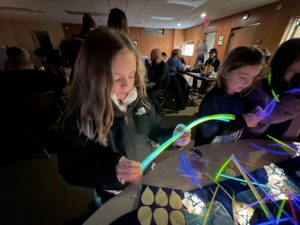
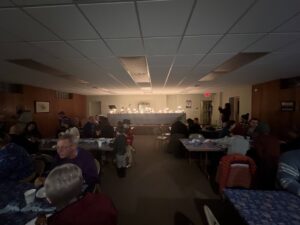
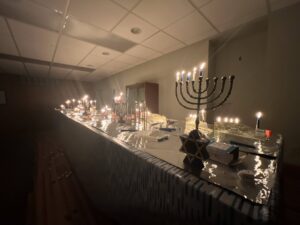
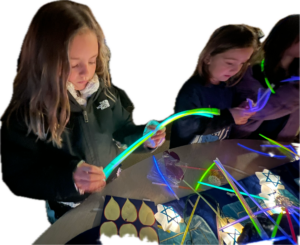
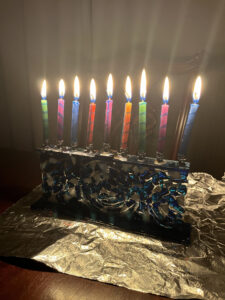
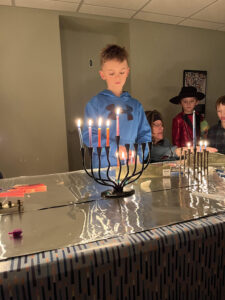
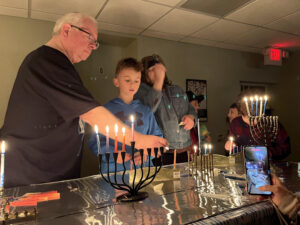
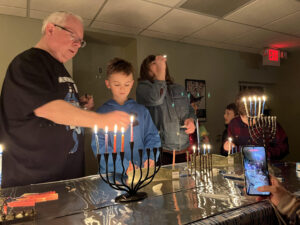
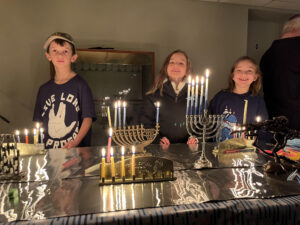
Chanukah Celebration 2023
